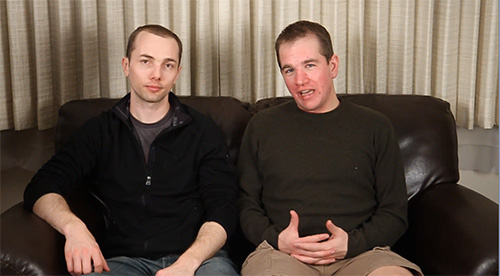It’s normally poor form in Western culture to talk about one’s income with acquaintances, but I did it anyway.
Earlier this year I was visiting with a good friend, a fellow Stanford engineering alumnus. Our meandering conversation eventually passed through his side business. Somehow, the topic of his revenue arose, and he pulled up the figures.
It wasn’t really a surprise. I’d known for a while roughly how much money he was making. Still, having the glowing numbers placed before my eyes was like a getting bucket of ice water dumped on my head. The reality became undeniable: my friend was in the much-maligned 1%, the top tier of earners in America.

From last fall's Occupy Boston protest. I wonder how many of these people actually were in the 1% but pretended to be in the 99%?
I’m not proud to admit that I felt a bit jealous. The fact that much of it was coming from a lifestyle business, not just his regular salary, made it even more painful.
Sure, my friend was a smart guy. He had identified a niche problem, built a good solution, and was reaping the rewards. He deserved his success. Still… why not me?! Arg.
That’s when I got the idea.
What if I used his success as inspiration for a new project? Stunts seem to have been my thing lately, and time was on my hands: my most recent contracting client mothballed my planned project due to budget constraints. I thought about it for a while, and then I hit on an intriguing challenge:
I will go from zero to $30,000 in non-salary, non-consulting income — and do it in a month.
In exactly 30 days, on May 7, I will turn 30 years old. How numerically alliterative it would be to earn $30k from entrepreneurial activities in that time: 30 in 30 by 30.
I get giddy just thinking about it. It melds well with a goal I set almost three years ago, in which I wrote that I’d like to be either wealthy or poor when I turned 30, not somewhere in the “mushy middle”:
“When I turn 30 in three years, I want to be either rich or penniless. The outcome doesn’t matter so much to me as long as it’s not the mushy middle; that would be indicative of a failure.” — Me in 2009
That was in the context of a post about the launch of my since-failed startup, but the sentiment remains. I’m not exactly broke, though spending most of last year gallivanting around America and Canada has left my bank account in sore need of replenishment.

But what would it take to be rich? The median annual income for Americans is — you guessed it — $30,000. If you change that from an annual income to a monthly income, the result you get is $360,000 per year. And that, conveniently, is the threshold for rarefied air. At that level, you join the 1%. Thus, the name for the project:
“One month to the 1%”
Impossible to achieve? I disagree. One way to look at it is that it’s only a factor of two from where I was while consulting. I feel that I’ve provided positive value to my clients in the past; presumably, they were making money off of what I developed for them, and probably much more than a factor of two. Why can’t I capture that value for myself?
Hell, I might even be shooting low.
Of course, it’s relatively easy to make a bunch of money as a consultant, but that would feel like cheating, and that’s why I’m not allowing myself to meet the challenge through consulting.
(If that surprises you, here’s the reality: it’s relatively easy to bill in the $100/hr neighborhood as a consultant, but it’s much more difficult to go to $200/hr, which is what would be needed to meet the challenge. I have reason to believe that many regular employees have no idea what the billing rates are like for engineering consultants. Consider your eyes opened.)
I have yet to figure out how I’m going to pull this off, but it seems likely that it will hinge on my ability to sell and promote as much as anything else. That will certainly push the bounds of my comfort zone, I’m more comfortable writing code than selling products. And what would I sell, anyway?
Uff-dah. The good news is that I have some ideas brewing.
Here are the rules in full:
- Accrual accounting
- Can’t be illegal
- Money made from consulting doesn’t count
- Neither does money made from being an employee
- Anything else is fair game
- Deadline: May 7, 2012
Daily progress updates Change of plans: progress updates when there is progress to report
And so, we start Day 1 at $0.




Recent Comments